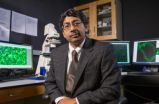(Press-News.org) Abnormal number of chromosomes is often associated with cancer development. In a new study published in the journal Nature Structural and Molecular Biology researchers at Karolinska Institutet in Sweden have shown that a subtle epigenetic change plays an important role in the correct segregation of chromosomes.
Normally when a cell divides, the chromosomes are segregated equally to two daughter cells. However, tumour cells frequently have either too few or too many chromosomes, leading to the incorrect expression of a number of genes. When a cell is about to divide, the cell division machinery takes hold of chromosomes by the centromere so that they may be pulled apart and one copy of each given to the daughter cells.
In the current study, researchers have shown that an epigenetic process, involving the attachment of a small protein to the histone H2B (called H2Bub1), facilitates an important structural change of the centromere immediately prior to cell division. It was previously shown that enzymes that modify histone H2B in this way also play a role in protecting against cancer. This was previously linked to defects in chromosomal repair.
"Our study confirms this role for H2Bub1, but we are extending it to include another mechanism that directly leads to the incorrect number of chromosomes in cells," says Peter Svensson at the Department of Biosciences and Nutrition, one of the researchers who conducted the study.
The researchers behind the new study say that the fact that this mechanism is highly similar in human cells and yeast cells suggests that it plays a key role in ensuring proper chromosome distribution following each cell division. The research has been funded by the Swedish Research Council, and the Swedish Cancer Society.
INFORMATION:
Publication: "Centromeric histone H2B monoubiquitination promotes noncoding transcription and chromatin integrity", Laia Sadeghi, Lee Siggens, J Peter Svensson & Karl Ekwall, Nature Structural & Molecular Biology, online 16 February 2013, doi.org/10.1038/nsmb.2776.
Contact the Press Office: ki.se/pressroom
Karolinska Institutet - a medical university: ki.se/english
Epigenetic regulation required to ensure correct number of chromosomes
2014-02-17
ELSE PRESS RELEASES FROM THIS DATE:
New eye layer has possible link to glaucoma
2014-02-17
A new layer in the human cornea — discovered by researchers at The University of Nottingham
last year — plays a vital role in the structure of the tissue that controls the flow of fluid
from the eye, research has shown. The findings, published in a paper in the British
Journal of Ophthalmology, could shed new light on glaucoma, a devastating disease caused by
defective drainage of fluid from the eye and the world's second leading cause of blindness.
The latest research shows that the new layer, dubbed Dua's Layer after the academic Professor
Harminder Dua who ...
Researchers hijack cancer migration mechanism to 'move' brain tumors
2014-02-17
One factor that makes glioblastoma cancers so difficult to treat is that malignant cells from the tumors spread throughout the brain by following nerve fibers and blood vessels to invade new locations. Now, researchers have learned to hijack this migratory mechanism, turning it against the cancer by using a film of nanofibers thinner than human hair to lure tumor cells away.
Instead of invading new areas, the migrating cells latch onto the specially-designed nanofibers and follow them to a location – potentially outside the brain – where they can be captured and killed. ...
U of M study finds fertilization destabilizes global grassland ecosystems
2014-02-17
A new study led by University of Minnesota researchers demonstrates that fertilization of natural grasslands -- either intentionally or unintentionally as a side effect of global farming and industry -- is having a destabilizing effect on global grassland ecosystems. Using a network of natural grassland research sites around the world called the Nutrient Network, the study represents the first time such a large experiment has been conducted using naturally occurring sites.
Led by Yann Hautier, a Marie Curie Fellow associated with both the Department of Ecology, Evolution, ...
New study shows growing opposition to animal tests
2014-02-17
Chicago — Americans' moral opposition to animal testing
has grown significantly since 2001, according to a new study presented today at the annual
meeting of the prestigious American Association for the Advancement of Science (AAAS) in
Chicago. Researchers from PETA and Western Governors University examined data collected
in independent surveys by the Gallup organization from 2001 to 2013, in which approximately
1,000 American adults each year were asked whether they found "medical testing on animals" to be
"morally acceptable" or "morally wrong."
The researchers ...
Mount Hood study suggests volcano eruptibility is rare
2014-02-17
Forecasts of when a volcano is ready to erupt could be a little closer thanks to work by
geologists at the University of California, Davis, and Oregon State University published online Feb.
16 in the journal Nature.
For an eruption to occur, the magma, or molten rock under the volcano must be sufficiently
mobile to erupt.
"The question is, what percentage of time is the magma in an eruptible state?" said Kari
Cooper, associate professor in the Department of Earth and Planetary Sciences at UC Davis and lead
author on the paper.
"People think about there being ...
Volcanoes, including Mt. Hood, can go from dormant to active quickly
2014-02-17
CORVALLIS, Ore. – A new study suggests that the magma sitting 4-5 kilometers beneath the surface of Oregon's Mount Hood has been stored in near-solid conditions for thousands of years, but that the time it takes to liquefy and potentially erupt is surprisingly short – perhaps as little as a couple of months.
The key, scientists say, is to elevate the temperature of the rock to more than 750 degrees Celsius, which can happen when hot magma from deep within the Earth's crust rises to the surface. It is the mixing of the two types of magma that triggered Mount Hood's last ...
River samples shed light on the spread of potential 'superbugs'
2014-02-17
The spread of antibiotic-resistance to one of the most pristine locations in Asia is linked to the annual human pilgrimages to the region, new research has shown.
Experts from Newcastle University, UK, and the Indian Institute of Technology in Delhi (IIT-Delhi), sampled water and sediments at seven sites along the Upper Ganges River, in the foothills of the Himalayas.
They found that in May and June, when hundreds of thousands of visitors travel to Rishikesh and Haridwar to visit sacred sites, levels of resistance genes that lead to "superbugs" were found to be about ...
New blood cells fight brain inflammation
2014-02-17
Hyperactivity of our immune system can cause a state of chronic inflammation. If chronic, the inflammation will affect our body and result in disease. In the devastating disease multiple sclerosis, hyperactivity of immune cells called T-cells induce chronic inflammation and degeneration of the brain. Researchers at BRIC, the University of Copenhagen, have identified a new type of regulatory blood cells that can combat such hyperactive T-cells in blood from patients with multiple sclerosis. By stimulating the regulatory blood cells, the researchers significantly decreased ...
Iowa State University's Wintersteen talks partnerships at national science meeting
2014-02-17
AMES, Iowa – Wendy Wintersteen, dean of Iowa State University's College of Agriculture and Life Sciences, spoke on Sunday of the importance of public-private partnerships in strengthening global food security during the annual meeting of the American Association for the Advancement of Science in Chicago.
During her talk, part of a panel on research and development for sustainable agriculture and food security, Wintersteen stressed the importance of partnerships in providing the innovation necessary to meet global challenges.
She said climate change, pests, plant ...
Scientists call for new stewardship of the deep ocean: Earth's last frontier
2014-02-17
The deep ocean, the largest domain for life on earth, is also its least explored environment. Humans are now encroaching more vigorously than ever into the ocean's deep regions, exploiting the deep's resources and placing its wealth of vibrant habitats and natural services for the planet at risk.
Lisa Levin, a biological oceanographer at Scripps Institution of Oceanography at UC San Diego, believes the vital functions provided by the deep sea—from carbon sequestration to nurturing fish stocks—are key to the health of the planet. As humans ramp up exploitation of deep-sea ...


